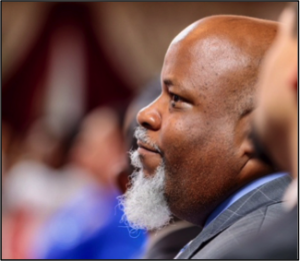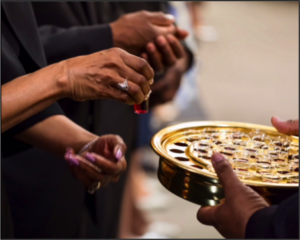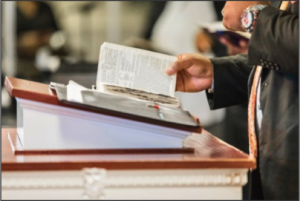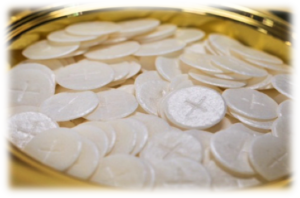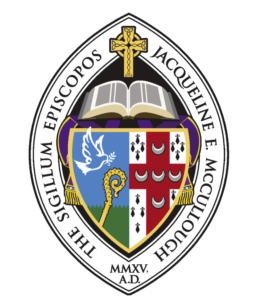School of Ministry & Theology
Establish a firm footing in the holy scriptures and prepare to defend the faith of our lord Jesus Christ.
“This is what theological education does; it makes you more precise, surgical and/or blunt, in your doing of ministry and serving, so that the Kingdom of God would suffer no loss.”
– The Rev. Dr. Brian O. McKenzie, Dean,
Level - Beginner through Doctoral
The School of Ministry and Theology is designed to provide you with an arsenal that will equip you to defend the faith and work effectively in serving our great God and His people.
11-Week Classes
Prepare to commit yourself to intensive study of the Word and doctrine from week to week.
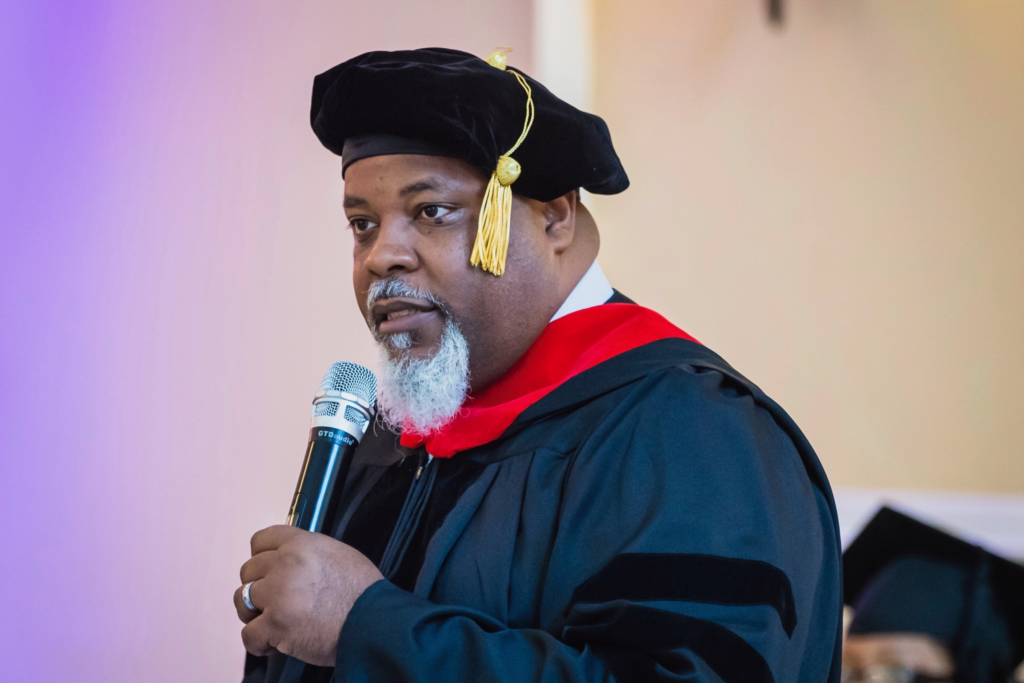
The Rev. Dr. Brian McKenzie, Sr., is the proud husband of Pastor Nadine McKenzie and father of three fine young men. Dr. Brian belongs to the scholarly Evangelical Theological Society and enjoys opening up the truths of Scripture as a teaching fellow in BRCCTS. Dr. Brian also enjoys pastoring God’s people and defending the faith that was once delivered to the Saints. In remembering Eric Lidell, Dr. Brian notes, “God made me a Christian but He also made me a theologian and when I’m teaching, I feel His pleasure.”
A Word from our Dean:
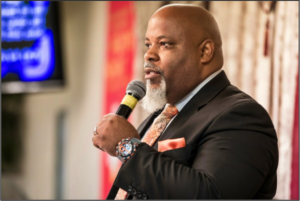 One morning I was having breakfast with a co-laborer in the Gospel about the movie Mission Impossible: Fallout. It was a great movie but there was one scene that was quite remarkable. Erica Sloan, played by Angela Bassett, was castigating Alan Hunley played by Alec Baldwin. Alec Baldwin’s team (Ethan Hunt played by Tom Cruise) had failed to procure a nuclear device. To ensure that their second rescue attempt of the device succeeded, she ordered her agent played by Henry Caville to accompany Ethan Hunt’s team. She said to Hunley in reference to how he approaches missions, “You use a scalpel, I prefer a hammer.†Immediately I thought about the implication of this approach to ministry and academic study, but not in the same order. In the Church we have a plethora of well-meaning believing souls who earnestly love the Lord and seek to do his will, and are doing it; however, how precise could one become if they pursued theological education as opposed to those who are contented where they are.
One morning I was having breakfast with a co-laborer in the Gospel about the movie Mission Impossible: Fallout. It was a great movie but there was one scene that was quite remarkable. Erica Sloan, played by Angela Bassett, was castigating Alan Hunley played by Alec Baldwin. Alec Baldwin’s team (Ethan Hunt played by Tom Cruise) had failed to procure a nuclear device. To ensure that their second rescue attempt of the device succeeded, she ordered her agent played by Henry Caville to accompany Ethan Hunt’s team. She said to Hunley in reference to how he approaches missions, “You use a scalpel, I prefer a hammer.†Immediately I thought about the implication of this approach to ministry and academic study, but not in the same order. In the Church we have a plethora of well-meaning believing souls who earnestly love the Lord and seek to do his will, and are doing it; however, how precise could one become if they pursued theological education as opposed to those who are contented where they are.
Recalling this line from the movie, many in the church are hammers and approach ministry (and all aspects of ministry), from a hammer mentality. Please note, that hammers are good for the church but not appropriate for every aspect of ministry. If you were to use a hammer on a walnut, you would get the nut open but what about the shell of the nut? All pieces of the nut should be preserved and left intact. The analogy is this, when you are ministering to someone, you want to be able to get to the need (the nut) of the person or ministry requires. You don’t need to disrupt or destroy the other parts of the person (the shell) or ministry if you have the tools to work more precisely. Some issues require a more surgical approach and some a more blunt approach. This is what theological education does; it makes you more precise, surgical and/or blunt, in your doing of ministry and serving, so that the kingdom of God would suffer no loss. With that said, I invite you to give yourself to the process of learning so that the doing of ministry may commence in a more excellent and exacting way. Below you will find a list of the Department of Ministry and Theology programs of study:
- Associates of Biblical Studies (A.B.S.)
- Bachelor of Divinity (B.Div.)
- Master of Divinity (M.Div.)
- Master of Theology (Th.M.)
- Doctor of Ministry (D.Min.)
- Doctor of Theology (Th.D.)
The Department of Ministry offers as noted above the Associates of Biblical Studies degree (A.B.S.); the Bachelor of Divinity degree (B.Div.); and the esteemed terminal Master of Divinity degree (M.Div.). The Department of Theology offers the esteemed Master of Theology degree, the (M.Th./Th.M.) and two doctoral degrees. The Department offers the highest degree in applied practical theology in the form of the Doctor of Ministry degree (D.Min.), and finally the degree that bridges applied theology with academic theory in the form of the prestigious Doctor of Theology degree (Th.D.). We are certain you will find yourself fully immersed in intensive, deeply embedded theological training as well as personal transformation when you engage in formal studies through the Departments of Theology and Ministry! Further descriptions of each program and course outlines are below.
Associate of Biblical Studies (A.B.S.)
The purpose of this degree will be to act as a foundation for study in all the programs of study for the Department of Ministry and Theology and the other departments as well (rf. Department of Christian Education, Department of Biblical Counseling, Department of Prayer and Missions, and the Department of Worship and Sacred Music). Through this program students will journey through survey, doctrinal, historical and theological, areas of study that will ground them in the faith, tradition and practice of the Christian Church. As noted earlier, this degree will directly feed into all of the other ministerial and theological degrees offered in the college. The goal is to give students introductory level instruction in Christian education.
Core Classes:
| Old Testament Survey I | BBL 300 | 3 |
| Old Testament Survey II | BBL 301 | 3 |
| New Testament Survey I | BBL 304 | 3 |
| New Testament Survey II | BBL 305 | 3 |
| Bible Doctrine | BBL 302 | 3 |
| Blood Covenant | BBL 303 | 3 |
| Ministerial Ethics | MIN 503 | 3 |
| Apologetics I&II | THE 571A | 3 |
| Life Teachings of Christ I | CED 300 | 3 |
| Life Teachings of Christ II | CED 301 | 3 |
The Five Solas of Reformed Theology THE 558 3
Foundational Classes to accompany the Core Classes in the department of Ministry and Theology for the A.B.S.
| Reformed Theology and the Church | THE 557 | 3 |
| Reformed Eschatology | THE 556 | 3 |
| Theodicy- The Theology of Suffering and the justification of God’s goodness | THE 514 | 3 |
| Homiletics | BBL 301 | 3 |
| Hermeneutics | BBL 323 | 3 |
| Realities of Hell | BBL 341 | 3 |
| Women in Ministry | MIN 560 | 3 |
| Church History I | THE 500 | 3 |
| Church History II | THE 501 | 3 |
| Total Classes | Total Credits |
| 20 | 60 |
The Bachelor of Divinity degree is a 120 credit program offered to students interested in beginning their journey towards specific ministerial practice. This program offers courses in ministerial etiquette and practice, preaching, Biblical interpretation, Biblical history, Church history, Biblical languages and Comparative religion. The goal of this degree is to give the student a foundation from which to do ministry and continue their studies in ministerial practice as this degree feeds right into the Master of Divinity degree (M.Div.); which is a professional degree available for those seeking full time pastoral, para-Church or ministerial training. Please note, courses listed here that have been satisfied under the ABS or accepted from another institution will leave room for more elective choices. See more elective choice offering in your course catalogue or below under the M.Div. elective choices. Deans approval is required for elective substitutes.
Bachelor of Divinity Courses
| English Composition I | ENG 101 | 3 |
| English Composition II | ENG 102 | 3 |
| Public Speaking | ENG 103 | 3 |
| Developing Effective Communication Skills | ENG 104 | 3 |
| Reading Resource Laboratory | ENG 105 | 3 |
| Competency Laboratory Experience (CLE) | ENG 106 | 3 |
| Church History Survey | HIS 301 | 3 |
| Ministry of the Mantle I | MIN 322 | 3 |
| Ministry of the Mantle II | MIN 323 | 3 |
| Homiletics I | MIN 301 | 3 |
| Hermeneutics | BBL 323 | 3 |
| People as Cultural and Social Beings | MIN 539 | 3 |
| Spiritual Formation | MIN 500 | 3 |
| Gifts of the Spirit | BBL 311 | 3 |
| Book of Acts | BBL 312 | 3 |
| Early Israeli History | BBL 313 | 3 |
| Old Testament Prophets I | BBL 315 | 3 |
| Old Testament Prophets II | BBL 316 | 3 |
| The Postexilic Period/Jewish Lit. and the Intertestamental period | BBL 317/ THE 560 | 3 |
| Language Requirement (Greek or Hebrew) | THE 321/CED 313 | 3 |
| Comparative Religions | THE 538 | 3 |
| Introduction to Philosophy | PHS 301 | 3 |
| Methods of Teaching I | CED 504 | 3 |
| Core Classes: | ||
| Old Testament Survey I | BBL 300 | 3 |
| Old Testament Survey II | BBL 301 | 3 |
| Blood Covenant | BBL 303 | 3 |
| New Testament Survey I | BBL 304 | 3 |
| New Testament Survey II | BBL 305 | 3 |
| Life Teachings of Christ I | CED 300 | 3 |
| Life Teachings of Christ II | CED 301 | 3 |
| Bible Doctrine | BBL 302 | 3 |
| Apologetics I | THE 571 | 3 |
| Apologetics II | THE 572 | 3 |
| Ministerial Ethics | MIN 300 | 3 |
| Practicum I: General Education Practicum | MIN 325 | 3 |
| Practicum II: Divinity Practicum | MIN 326 | 3 |
| Electives: | ||
| American Church History | HIS 300 | 3 |
| Kingdom Period | BBL 318 | 3 |
| Old Testament Theology | THE 519 | 3 |
| New Testament Theology | THE 529 | 3 |
| Total Classes | Total Credits |
| 40 | 120 |
The Master of Divinity degree is a terminal degree offered by the seminary for those interested in continuing their journey from the B.Div. or beginning their ministerial training altogether. The reason why this degree is called terminal differs from seminary to seminary. Here at BRCC terminal means that it is the best or minimal degree offered for professional training in ministry. It is such a coveted degree because once one finishes this degree they are pretty much prepared to lead a congregation, para-Church ministry or mission, in every way. It comprises of both a professional, theoretical and practical element, which prepares the student for the longevity needed to do effective ministry in any setting. This is a 96 credit program which can be completed in 2 years. Students will be given further opportunities to advance their ministerial sense through courses in Church organization, Conflict resolution, Biblical Counseling, Church ethics and Spiritual warfare and Missions. Please note, classes already fulfilled under the B.Div or transferred from another institution will automatically make room for the student to fill their program with elective choices at the Dean’s discretion.
Â
Master of Divinity Courses
| Conflict Resolution | MIN 552 | 3 |
| People as Cultural and Social Beings | MIN 539 | 3 |
| Church Administration | CHSOC 553 | 3 |
| Church as a Political and Civic Institution | CHSOC 554 | 3 |
| Ministry of the Mantle I | MIN 556 | 3 |
| Ministry of the Mantle II | MIN 557 | 3 |
| Theology of Prayer | THE 517 | 3 |
| Church History I | THE 500 | 3 |
| Church History II | THE 501 | 3 |
| Old Testament Theology | THE 519 | 3 |
| New Testament Theology | THE 529 | 3 |
| Systematic Theology I | THE 561 | 3 |
| Systematic Theology II | THE 562 | 3 |
| Basics of Biblical Greek I | THE321/CED512 | 3 |
| Basics of Biblical Hebrew I | THE524/CED513 | 3 |
| Spiritual Formation | SF500/MIN500 | 3 |
| Homiletics | MIN 301 | 3 |
| Hermeneutics | BBL 323 | 3 |
| Methods of Teaching I | CED 504 | 3 |
| Christian Education I | CED 502 | 3 |
| Christian Education II | CED 503 | 3 |
| The Church at Worship I | THE 515 | 3 |
| The Church at Worship II | THE 516 | 3 |
| Christian Ethics | MIN 540 | 3 |
| Pastoral Care & Counseling/Biblical Counseling I | MIN 555 | 3 |
| Marriage and Family Therapy | MIN 543 | 3 |
| Anatomy of Addiction and Recovery | MIN 506 | 3 |
| Creating and Leading Small Groups | MIN 542 | 3 |
| Christianity in the Global Context | THE 509 | 3 |
| Comparative Religions | THE 538 | 3 |
| Life Teachings of Christ I | CED 300 | 3 |
| Life Teachings of Christ II | CED 301 | 3 |
| Power Encounters with Spirits | THE 555 | 3 |
| Introduction to Philosophy | PHS 301 | 3 |
| Apologetics I | THE 571 | 3 |
| Graduate Teaching Assistantship | CED598/THE568 | 3 |
| Thesis | THE 592 | 3 |
| Total Classes so far | 37 |
Â
Above course load comprises 81 Credits. Electives to add to the M.Div. course load (if needed) are 15 Credits. The Elective choices are below.
Biblical Leadership I
Biblical Leadership II
Ascetic Theology
Anatomy of Addiction and Freedom
Liturgical Theology and History
Historical Theology
Early Church Fathers
Islam and Christianity
Buddhism and Christianity
The Revelation of John
Life and Epistles of Paul
Theology of Prayer
Basics of Biblical Hebrew
The Pentateuch
Old Testament Theology
Church Intercession
Fasting
Theodicy (Theology of Suffering)
The Formation of the Biblical Canon
Theology of Prayer
Ascetic Theology
Methods of Teaching II
Minor Prophets
Major Prophets
Jeremiah
Daniel
Judges
Blood Covenant
Jewish Literature and The Intertestamental Period
Marriage & Family Therapy
Youth Counseling
Counseling Post Abortion
Abuse & Crisis Counseling
Approaches to Counseling
Death & Grief Counseling
Mentoring Men
Book of Matthew
| Total Classes | Total Credits |
| 42 | 96 |
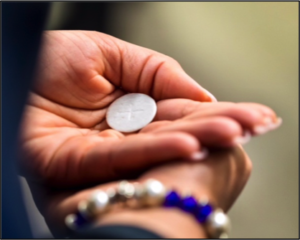 Master of Theology (Th.M./M.Th)
Master of Theology (Th.M./M.Th)
The Master of Theology degree is a program suited for those who are looking at advanced academic or even doctoral level study. This degree seeks to offer the philosophical, theological, research and academic tools, needed for advanced study and even publishing. Students are required to have a Bachelors or Masters level degree in a related field of study before entering the program. This is a 57 credit degree program that will prepare the student to think philosophically, theologically and academically about Church, Liturgy, Doctrine, Church history and Ethics, with specificity. The student who enters this program may focus on a specific area of Christian endeavor. This degree is not an add-on or hyper M.Div., this degree creates the space for the student to specify and journey intentionally into a field of academic study. This degree is usually best suited for students preparing for study in the Th.D. program, preparing to write or teach in an academic setting or publish in scholarly circles. Possible areas of study may be: Pauline studies, Glossolalia, the Apocrypha, some aspect of Ascetic theology, Historical Jesus, Creation narrative, Liturgical studies, linguistic study, Ancient Near Eastern studies, Early Church, etc.
Master of Theology courses
| Curriculum Development | CED 506 | 3 |
| Theology of Cornelius Van Til | THE 557 | 3 |
| Historical Theology | THE 531 | 3 |
| Practical Theology | THE 551 | 3 |
| Multi-Cultural Ministry | MIN716/CED708 | 3 |
| Reformation Theology and The Church | THE 551 | 3 |
| Apologetics I | THE 571 | 3 |
| Modern Apologetic Thought | THE 549 | 3 |
| Theodicy (Theology of Suffering) | THE 514 | 3 |
| Old Testament Theology | THE 519 | 3 |
| New Testament Theology | THE 529 | 3 |
| Methods of Teachings I | CED 504 | 3 |
| Methods of Teachings II | CED 505 | 3 |
| Formation of the Biblical Canon | THE 518 | 3 |
| Ascetic Theology | THE 520 | 3 |
| Patristic Theology | THE 564 | 3 |
| Practicum | THE 590 | 3 |
| Design, Scope, Content and Initiation of the Doctoral Dissertation/Thesis | BCO 732 | 3 |
| Master’s Thesis | THE 591 | 3 |
| Total Classes | Total Credits |
| 19 | 57 |
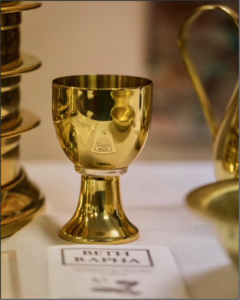 Doctor of Ministry Degree (D.Min.)
Doctor of Ministry Degree (D.Min.)
Why would you want to do a Doctorate of Ministry Degree at Beth Rapha Christian College & Theological Seminary?
The Doctor of Ministry (D.Min.) degree is one of the most respected degrees for ministry professionals in that it is understood as a practical ministry degree in applied theology. Because the Doctor of Ministry degree is a practical degree, it seeks to sharpen the ministerial practices of those already entrenched in the vineyard of local, national and international ministry. One of the reasons a student would wish to pursue their Doctorate in this area is because the goal of the instructors is to prepare the whole student for practical, theological, Bible based ministry in any ministry setting. Often, D.Min. programs focus on preparing the student for the practical challenges of parish, para-church or institutional ministry, without taking into consideration that talent, gifting and education alone cannot be trusted to propel you to a place of prominence. Talent to take you to a high place but only your character can keep you in that place. In other words, talent can take you there but only character can keep you there. Hence, a holistic approach to the student is engaged so that their ministry sense and skills are sharpened, their organizational aptitude is matured, and their character development is secured; all in the hope that longevity and integrity will kiss the work of Christ in that vineyard!
The D.Min. is distinct from the Th.D. and the Ph.D. degrees in that its focus is more practical and applied for use in a static ministry setting. D.Min. candidates usually continue to work and pursue assignments in ministry settings where applied theology is necessary and mandated. The D.Min. is the best degree for those actively engaged in full-time ministry and who are looking to sharpen their ministerial and leadership skills. The D.Min. is also the wisest degree for those seeking to grow a ministry or reflect critically on the best ministerial practices.
Students who work through a D. Min. degree will:
- Be able to reduce to text in the form of a dissertation, the ministerial project in applied practical theology. In other words, the ministry project that the student undertakes for the duration of the D.Min. will be codified in the form of the Doctoral dissertation.
- Be able to sharpen their ministry skills by thinking critically about their practice, discipline and ministry, in a way that they may not have been challenged to do before.
- Be able to articulate the dynamics of their ministerial practice not only in written form but also verbally and instructionally, so that duplication of God’s vision is transmitted generationally and institutionally.
- Be able to connect the work of the Holy Spirit through the ages with that of what Christ is doing in their respective ministries.
Requirements for the Doctor of Ministry degree are:
- Applicants should have a Masters of Divinity degree before entering the program. This has been a traditional requirement because remember, the D.Min. is a practical ministerial degree in applied theology. Hence, most of the credits for the D.Min. degree will deal with issues related to practical ministry such as: theology, preaching, counseling, Bible, civic responsibility, etc. Please note that if the applicant does not have an M.Div., a Masters Degree with ministerial experience can be used to satisfy the requirement. Applicants should be engaged in a ministerial capacity at the time of enrollment.
- Applicants should have at least 2-3 years of fulltime professional experience in their ministry before applying to the D.Min. program.
- Applicants should submit a writing sample demonstrating theological and ministerial sensitivity and facility.
- Applicants should submit a personal statement as to why they feel the D.Min. is right for them.
- Applicants should present 2 letters of Recommendation. One letter from both their Senior Pastor and a recognized official from their parish (the applicant should belong to a Church). If you are the Pastor then an official in your Church and one of your members should submit the letters of Recommendation.
What are the areas of concentration for those seeking a Doctor of Ministry degree?
- Concentration in Spiritual Formation and Congregational Development
- Concentration in Biblical Leadership in the 21st Century
- Concentration in Missional Leadership
What Is the sequence of classes that the Doctoral student must work through towards the completion of the program?
- The Doctoral Design Seminar
- 7 Core courses,
- Teaching Practicum
- Prospectus Design
- The Dissertation
- Doctoral Defense
The D.Min. is 52 Credits. The D.Min. degree can be completed within 2-3 years with 5 permitted by permission. Please note, the D.Min. program will run on a 5 month semester scale as opposed to a 2 1/5 month quarterly cycle.
Below is a breakdown of each section:
Doctoral Seminar in Graduate research methods (4 Credits)
This seminar will help the graduate student become familiar with the major questions and issues related to doctoral level study and research. The student will be introduced to research samples and professionals who have engaged in graduate level study. The presenters will work to help them navigate the rigors and benefits of theological and practical research so that the apprehension to doctoral study is resolved. Support in research methods and personal management will also be given so that perseverance ensures completion. Remember, most students statistically speaking, achieve degrees not because there is any more intelligence than the next person but because of perseverance.
7 Courses related to the Doctoral Students Concentration (28 Credits)
These 5 courses will feed into and relate to the Doctoral student’s major concentration.
- Spiritual Formation and Character development for Ministry
- Ministry of the Mantle and Leadership development
- Examining Ministerial issues related to the Local and Global context
- Ancient/Future Leadership in the 21st. Century
- Congregational and People dynamics related to Church Growth
The remaining 2 Elective courses will feed and relate to the Doctoral student’s minor concentration.
The student may choose any two from the list of Core and Elective courses already offered on the Masters Level course list. Please note, the work will be significantly different for the doctoral student due to the nature of the degree pursued. The minor courses ought to directly impact or support in some way the major concentration.
Teaching Practicum (2 courses= 8 Credits)
Student will have an opportunity to exercise their gifts, knowledge and experience teaching either an already existent course or produce an original course to the college’s curriculum. Through this process the students dissertation topic may crystalize for them.
Prospectus Design (1 course= 0 Credit)
As part of The Beth Rapha Bible College and Seminary’s commitment to excellence, this course will provide practical oversight of the candidate’s progress in their dissertation through on site visitation and assessment by proctors assigned to the candidate’s dissertation project. The student will be given opportunities to work through how the dissertation will be shaped and how the content will be organized. This course carries no credit weight but is an assurance that the student is on course for their dissertation and defense.
Final Project Dissertation and Defense (8 Credits = 1 year)
At this stage, the student is in the process of writing the dissertation and formulating the bibliography. At the end of the process the student will be given a date for the defense of the dissertation. The student will submit copies of their dissertation to members of the examination committee and present a copy for the archives of The Beth Rapha Bible College and Seminary. Please note, that usually one full year is given for the writing of one’s dissertation which in some circumstances has necessitated either less or more of that time. In the event that it takes a student more time to complete the dissertation, an extension can be requested and granted at the discretion of the department/committee chair.
Â
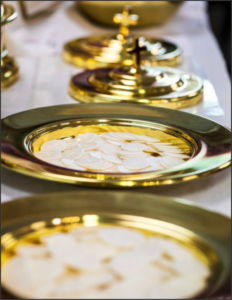 Doctorate of Theology Degree (Th.D.)
Doctorate of Theology Degree (Th.D.)
Why would you want to engage in a Doctorate of Theology Degree?
The Doctor of Theology degree is one of the most respected degrees for ministry professionals interested in the convergence of theoretical Theology and applied ministry. The Doctor of Theology degree seeks to sharpen the approach to research in an area of scholarly interest and also provides ample space for the application of that research in or surrounding the realm where people and theology merge. One of the reasons a student would want to do their doctorate through our program is because the goal of the Instructors is to prepare the whole student for the practical work involved in theological, academic, and Bible based ministry, in any ministerial, scholastic or theological setting.
Often, doctoral programs focus on preparing the student for the practical or academic challenges of research. Too often they do not take into consideration the fact that talent, gifting and education alone cannot sustain a person in ministry. Hence, a holistic approach to the student is engaged so that their ministry sense and skills are sharpened, their organizational aptitude is matured, and their character development is secured. Usually when one graduates with the Th.D. degree, an academic, liturgical or institutional position is sought.
Students who work through a Doctorate of Theology Degree will:
- Be able to reduce to text in the form of a dissertation an original contribution to scholarly thought and research.
- Also, the student will be able to connect the theoretical, philosophical and practical spheres of Christian education to Christian and secular experience.
- Be able to sharpen their research and analytical skills by thinking critically about their discipline in relationship to the context of Christian communities.
- Be able to articulate the dynamics of their research project, not only in written form, but also verbally and instructionally. This will allow for duplication of God’s vision academically, generationally and institutionally.
- Be able to connect the work of the Holy Spirit through the ages with that which Christ is doing in the context of Christian communities.
Requirements for the Doctor of Theology Degree:
They should have completed the core from this institution. Applicants should have a Masters of Divinity (M.Div.), Masters of Sacred Theology (S.T.M.), or Masters in Religious Studies (M.R.E.) degree before entering the program. This has been a traditional requirement because the Doctor of Theology is a research degree with a practical approach to applied theology. The term ‘applied’ here meaning the students research will seek to address and contribute some original discussion and research in the circles of theology, history, society, ethics or religion. As formerly noted most of the courses for the doctorate degree will specialize in areas of theological scholarship such as: Theology, Church History, Preaching, Religion and Society, Counseling, Ethics, Gender issues, Bible, Civic responsibility, etc. Please note that if the applicant does not have an M.Div. or S.T.M degree, a Master’s Degree with ministerial experience can be used to satisfy the requirement at the discretion of the dean and department chair.
- Applicants should submit a 2 page personal statement explaining why they feel the Th.D is appropriate for their studies.
- Applicants should present 2 letters of recommendation. One letter should come from their senior pastor (If they are a pastor then an official in the church); and the other from a recognized official from their parish (the applicant should belong to a Church).
- Applicants should submit a sample of their writing within the scope of theology, church history, missions, etc.
What are the areas of concentration for those seeking a Doctor of Theology degree?
- Concentration in Religion and Society
- Concentration in Ethics
- Concentration in Biblical Studies
- Concentration in Christian History and Spiritual Formation
 What is the sequence of classes that the Doctoral student must work through towards the completion of the program?
What is the sequence of classes that the Doctoral student must work through towards the completion of the program?
- The Doctoral Seminar,
- 8 Core courses,
- Teaching Practicum,
- Prospectus Design,
- General Examination
- Dissertation
- Doctoral defense
for a total of 52 Credits. The Th.D. degree can be completed within 3 years. If needed, extensions will be granted at the discretion of the Dean of the School.
Below is a breakdown of each section:
Doctoral Seminar in Graduate research methods (4 Credits)
This seminar will help the graduate student become familiar with the major questions and issues related to doctoral level study and research. The student will be introduced to research samples and professionals who have engaged in graduate level study. The presenters will work to help them navigate the rigors and benefits of theological and practical research so that the apprehension to doctoral study is resolved. Support in research methods and personal management will also be given so that perseverance ensures completion. Remember, most students complete degree programs because of perseverance not intelligence.
8 Courses related to the Doctoral Students Concentration (27 Credits)
- Spiritual Formation and Character development for Ministry (4)
- Ancient/Future Leadership in the 21st. Century (4)
- Congregational and People dynamics related to Church Growth (4)
The remaining five elective courses (3 Credits each) will feed and relate to the doctoral students minor concentration. The student may choose any core and elective courses already offered on the master’s level course list. Please note, the work will also be significantly different for the doctoral student due to the nature of the degree pursued. The courses ought to directly impact or support in some way the major concentration.
The student will be given two opportunities to teach classes to graduate and undergraduate students seeking to fulfill a master’s or bachelor’s degree program. Classes may be an original contribution to the curriculum or the candidate may teach what is already offered from the course list.
Exploring the Design, Scope, Content and Initiation in the Dissertation (0 Credits)
This seminar will work to consolidate the thought, practice and scope of the student’s prospectus. It will also include the specific approach to the collection of data, bibliography and organization of content for the dissertation.
General Examinations Related to proficiency in the Concentration Area (0 Credits) The student will take two written examinations in the field of their concentration to assess proficiency with the dynamics, issues and rigors associated with that field of scholarship.
Final Project and Dissertation Defense (1 year= 8 Credits)
At this stage, the student is in the process to begin writing the dissertation and formulating the bibliography. At the end of the process the student will be given a date for the defense of the dissertation. The student will submit bound copies to members of the examination committee and present a copy for the archives of BRCC. One full year is dedicated to the writing of one’s dissertation. If needed, students may request an extension which will be granted at the discretion of the Dean of the School. The student will also take the Design Seminar for the prospectus submission. The prospectus should be approximately seven pages in length (1750 words). At this point the student will engage in the writing of the dissertation and at the end of the process, be required to defend it before the faculty examination committee. The length of the dissertation should be between 200-250 pages (not including the bibliography). The dissertation should have an accompanying abstract. One bound dissertation should be submitted to each committee member and one copy for the archives of our school.
Enroll in Class Today!
We have an extensive list of online classes that are available for you to choose from!Â
Make your calling and election sure as you immerse yourself in God’s living Word!
